
A decade ago, two young Latvians, fresh from volunteering at Stockholm Pride, decided the time was right for Riga to host its own festival. They planned a small parade through the capital's old town and applied to the city council for permission. Perhaps without quite realizing what it was getting itself into, the council accepted the proposal. Latvia was to get its very first public LGBT event, and no one knew what to expect.
That changed when a local Catholic church caught wind of the plans. Incandescent with anger at the idea of homosexuals flagrantly capering past their sacred space, the church united with some equally outraged politicians to ban the event. The council conformed in a decision that drew widespread media reportage. Riga Pride was now national news, and when a court overturned the council's festival ban two days later, the coverage intensified.
Seventy LGBT activists took to the streets of Riga on July 22, 2005. They were met by thousands of protesters. If the message of the council hadn't been clear before, the protesters were clarifying now: Homosexuality had no place in Latvia.
Tensions escalated and an overwhelmed and underprepared police force formed a protective ring around the participants and altered the parade's route. As things turned violent, members of a nearby Anglican church offered the parade participants sanctuary. They waited there for hours while the police attempted to clear the crowd. When they eventually emerged through a back door, they were pelted with eggs and vegetables by defiant protesters.
Latvia's first and only LGBT organization, Mozaika, was born out of the homophobia experienced that day. Since then, its members have persevered and transformed Riga Pride into an annual event, one which now attracts thousands of participants. Though it still faces vocal opposition and repeated attempts to ban it, protester enthusiasm has dwindled to the extent that only a few hundred bothered counter-demonstrating in 2014.
It's a sign of progress, but the reality is that the annual festivities of Pride are a brief hiatus from the closet for the country's LGBT community. Latvia remains a deeply conservative society, one influenced by its powerful Russian neighbors and religious tradition. With homophobia still rampant, LGBT visibility is negligible. Those who are out in public face marginalization, verbal abuse, and violence.
This June, 10 years after that first march, EuroPride will parade through the capital in all its feathered glory. It could be the catalyst to change that Latvia's LGBT community so desperately needs.

The Russian Influence
In 2012, Pride organizing bodies from across the continent cast their vote to pick the 2015 host of EuroPride, the pan-European annual parade that has often drawn bigger crowds than WorldPride events. Originally held in London in 1992, the annual festival has traveled to some of Europe's best-known cities and LGBT hot spots -- from Oslo to Berlin, Stockholm to Madrid, where it attracted an estimated 2.5 million visitors in 2007.
As well as Riga, Vienna, and Manchester, candidate cities included Milan and Barcelona, both vying to make their debuts. The allure of finally bringing the festival to the gay-friendly streets of either provided tough competition for Mozaika, who headed up Riga's bid. But for the electorate, organizers, and even Vienna Pride (which dropped out in support of Riga), not only was the decision an easy one, it just felt right.
"Overall the general consensus was that it was time to go to Riga," says Hans De Meyer, president of the European Pride Organisers Association (EPOA). "Five years ago we had it in Warsaw, and that was actually the first time EuroPride went into the Eastern part of Europe and the areas we consider hostile. So I think the majority felt it was quite important."
Local hostility didn't factor against Riga. It was a reason to go there. And with this summer marking a decade on from the city's first parade, as well as the recent 25-year anniversary since the fall of the Berlin Wall, the timing couldn't have been better for the former Soviet nation that borders Russia.
During the election period, Russian politicians were aggressively stoking homophobic sentiment domestically. Many regional authorities had already enacted versions of the now infamous nationwide embargo on "homosexual propaganda." With Moscow Pride permanently banned for the next century, the opportunity to plant a rainbow flag on Putin's doorstep was not to be missed.
"We're not allowed to go into [Russia] without getting arrested for being who we are, so of course [EuroPride is] the next best thing we can do," says De Meyer. "It's not only Latvia; if you look at what happened last year in Baltic Pride and the difficulties they had organizing it in Vilnius, Lithuania, the country next door, it's exactly the same thing. There's still this Russian influence that plays a part in the acceptance of LGBT rights."
In the three years since Riga won the bid, the situation has worsened in Russia and other ex-Soviet states. Belarus and Lithuania have considered implementing their own bans on homosexual propaganda, while Ukraine has experienced a string of high-profile homophobic attacks from various neo-Nazi factions. The need to march in Eastern Europe has only intensified.
"It's strengthened people's ideas that we have to fight this, and because people don't have that opportunity in their country, we have to do it from outside," says De Meyer. "I just hope with this event that in Latvia, the rest of the Baltic states and other countries like Belarus and Russia, people will recognize that it's time to stand up."

Obstruction of Justice
Latvia's predominantly conservative society doesn't share such sentiments. After Riga's first event in 2005 caused widespread outrage, anti-gay politicians and activists recognized the political capital to be gained from fanning the flames of homophobia and pandering to the country's devout Christian contingent. Condemning Pride was an easy way to secure votes.
In a bid to stop any follow-up festivals, No Pride was formed, becoming Latvia's anti-LGBT umbrella organization. It has tried numerous times to have Riga Pride banned, with mixed results. Kristine Garina marched in the original parade and was one of the founding members of Mozaika. Now chairperson, she and her associates have faced an uphill battle to make Pride an annual event.
"In 2006 the Pride was banned. We went to court and lost, so it didn't happen that year," she says. "But the following year we won in the next institution, the Supreme Court. It was too late as we couldn't go back and organize it [for 2006], but we now have a Supreme Court decision which says that just because some part of society doesn't like it is not a reason to ban it."
Immediately after Mozaika triumphed in the EuroPride elections, No Pride, led by Riga city council member and notorious homophobe Ja-nis Smits, set to work. Among other accusations, it claimed the festival would violate the country's constitution and breach the laws protecting children. The indignation and homophobic rhetoric could do little to circumvent a Supreme Court decision.
More recent obstructions have come from the anti-gay Antigloba-listi association, which tried to occupy EuroPride's space by hosting its own parade, where it hoped to promote "family values." Local law dictates that event applications can be submitted to the city council no earlier than four months before they take place. By extending its proposal to include the days before EuroPride, Antigloba-listi outmaneuvered Mozaika and registered its bid earliest, securing first refusal.
It gave the city council a decision to make, one with consequences beyond Riga.
The protection of LGBT citizens is seen as a fundamental part of European Union membership, and, regardless of domestic law, siding with Antigloba-listi would alienate Latvia from key European partners. It would be particularly embarrassing considering Latvia currently holds the presidency of the European council. At a time when many ex-Soviet states are trying to expel Russian influence, a decision either way would be loaded with symbolism. The council, perhaps sensing this, sided with Mozaika.
While anti-gay rhetoric is still infiltrating Latvia's political stage, it's now widely condemned. Just last year Inga Priede, a senior member of Latvia's ruling party, praised the Nazi extermination of gay men as being good for demographics. The resulting backlash forced her resignation.
Even external attempts to bring homophobia into politics are failing. Last year a petition was launched, calling for the adoption of Russian-style homosexual propaganda laws. Despite widespread media attention, it amassed only 10,000 signatures, falling far short of the 30,000 needed to initiate the desired referendum. On the political scene, at least, the situation is improving. Even Latvia's minister of foreign affairs, Edgars Rinke-vicVs, felt comfortable enough to come out.
"It's a very slow process, but in 10 years we've grown and at least openly homophobic speeches are not OK anymore in parliament," says Garina. "They are still homophobic individuals, of course, and there are politicians who openly said they're going to ban [EuroPride], but they spoke before they could think about it clearly. If they had thought about it they'd have realized that's not going to be possible, because of E.U. rules and the court cases we've already won. You can ban it if you want, but it's a waste of taxpayers' money because you know what's going to happen next. We're going to appeal and we're going to win."

A Closeted Community
The decision to award EuroPride to Riga prompted outward reactions from both camps in Latvia -- celebrations from Mozaika, condemnation from conservatives. But the response from Latvia's wider LGBT population was conspicuous by its absence.
"It's quite difficult to know what the reaction from the LGBT community is because it's in hiding," says Garina. "There is no community. Everybody is in the closet."
Homophobic attitudes are prevalent throughout Latvia, and LGBT visibility is suppressed by fear. Outside of Riga's annual Pride festivities, the only visible signs of anything queer are its two gay bars, Golden and XXL. Even after multiple successful Pride parades, the gay community remains almost entirely underground. Public displays of homosexuality are actively discouraged, and homophobic hate crimes go unreported for fear of being outed. With Mozaika's influence primarily limited to the capital, Garina suspects the situation in rural Latvia is much worse.
Twenty-five-year-old Janis grew up in the capital, and while he is out to a few of his closest friends, demonstrating such openness in public just isn't an option. "Most people in Latvia have prejudices against homosexuality," he says. "There are very few well-known members of society that are out and proud, so it's quite hard being LGBT youth in Latvia. There is no role model to say that being gay is OK."
The high-profile coming out of Rinke-vicVs is a move in the right direction, but for now at least, the freedom of expression enjoyed throughout Western Europe is a distant ambition. EuroPride may not be the panacea to make coming out easier, but for those like Janis, who just want the opportunity to be who they are, with no fear of repercussion, it is an opportunity to escape the oppression of the closet and be themselves in their home country for at least one day in the year.
"It shows the local LGBT community that we're not alone, and I think this is very important aspect in such a closeted LGBT community," says Janis. "It's a possibility to have new experiences, meet new people and widen your knowledge of LGBT activities. The situation is changing, slowly but unstoppably. Members of my generation, 20-somethings, are the icebreakers for overall acceptance of homosexuality. It's just not that big of a deal anymore."

The Power to Inspire
The last time EuroPride ventured into a less-friendly environment was in 2010 when Warsaw played host, becoming the first former communist state to do so. Though the 8,000 participants paled in comparison to the 100,000 at the previous event in Zurich, the event was deemed a huge success, attracting LGBT tourists from all over Europe and showcasing a modern, more progressive Poland.
But EuroPride veterans accustomed to the loud trucks and festooned affairs of Stockholm or Madrid would have been shocked by the heavy police presence and fascist demonstrators, who hurled projectiles and tore down flags. To the older generation it was a poignant reminder of Pride's origins; for millennials, a history lesson. Just the opportunity to march can often be an achievement.
"If you go into Eastern Europe, they celebrate it in a much more discreet way," says De Meyer. "They don't want to rustle feathers too much. They want to stand up and be able to do something, but they have to live with certain limitations that still exist. If I think back to EuroPride in Warsaw, it was quite oppressive for people that were not used to going to Pride in a hostile environment."
"But if you look at Warsaw now, I'm not saying the situation is completely perfect, but there is strength and more entertainment, or activities for LGBT people in the city. People are not hiding as much as they used to do. Even the LGBT venues, whether it's a bar, club or bookstore, for instance, they're not as underground as they used to be before. So it is evolving."
When EuroPride hits Riga, it's unlikely to attract anywhere near the numbers experienced by events in Italy, Spain, or the U.K. But its legacy could be far greater. As LGBT rights progress, as the fight for equality succeeds, the meaning of Pride shifts -- from demonstration to celebration. The defiant marches become victory parades, a tribute to all those who fought for equality and won. In June this year, when the parade through Riga follows in the footsteps of 70 activists a decade ago, we may just witness that transformation firsthand.
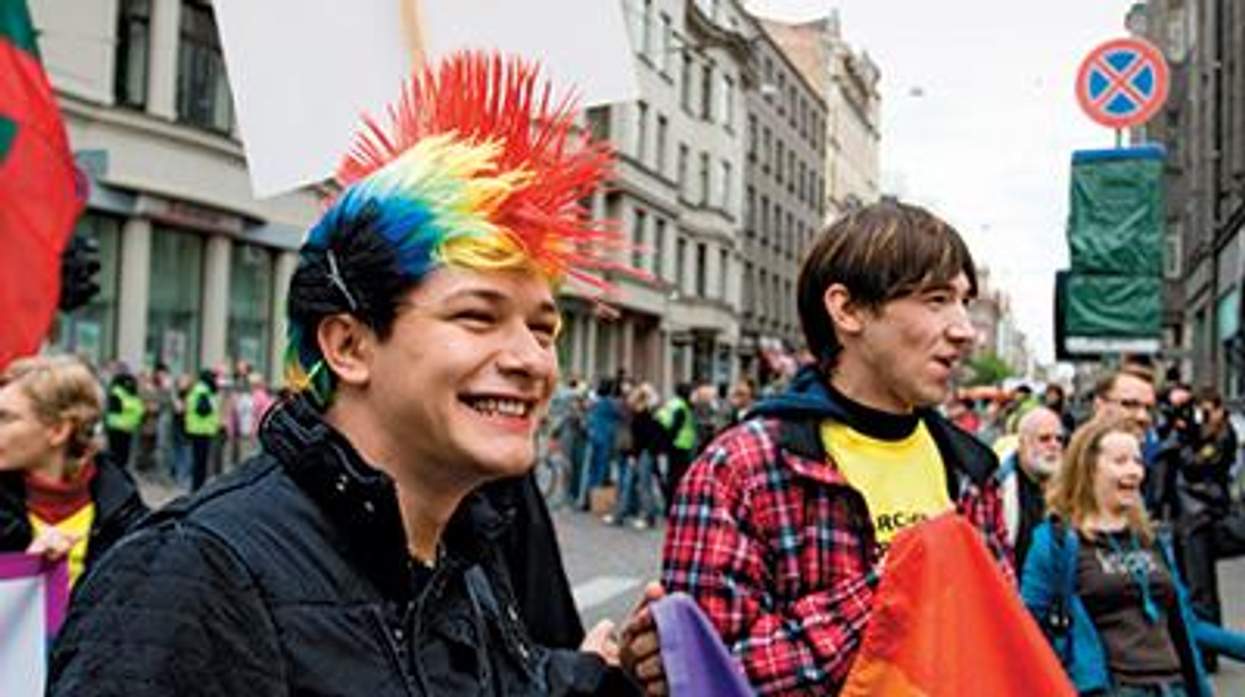

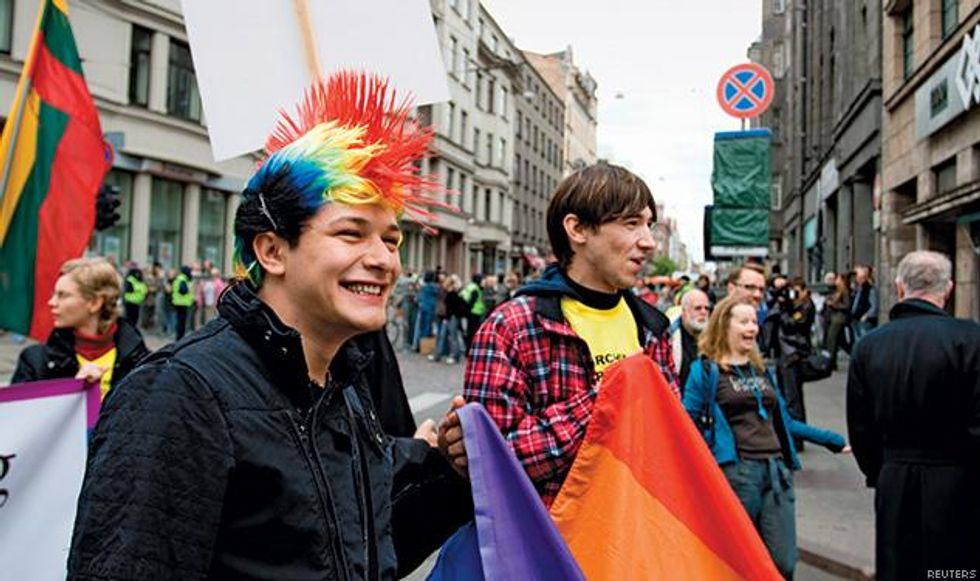
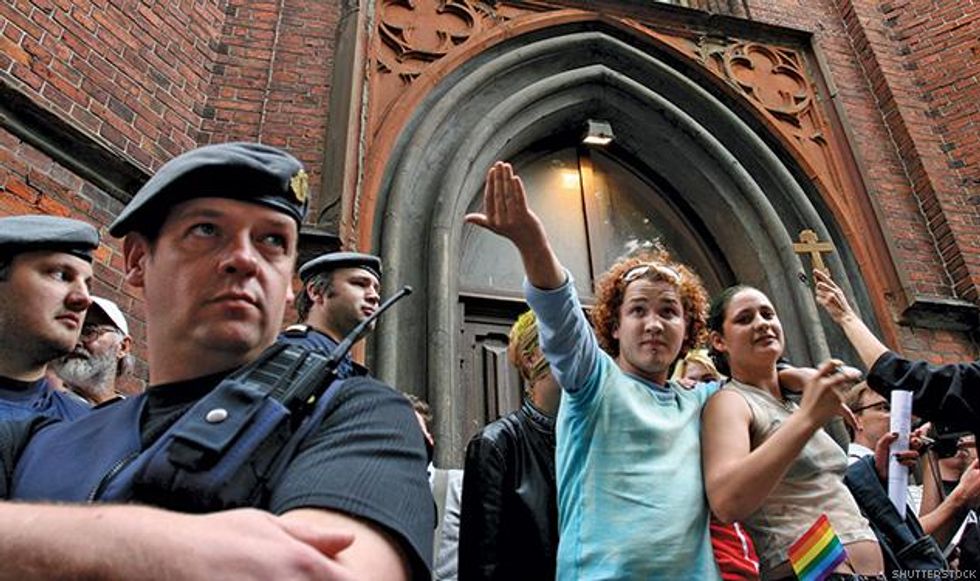
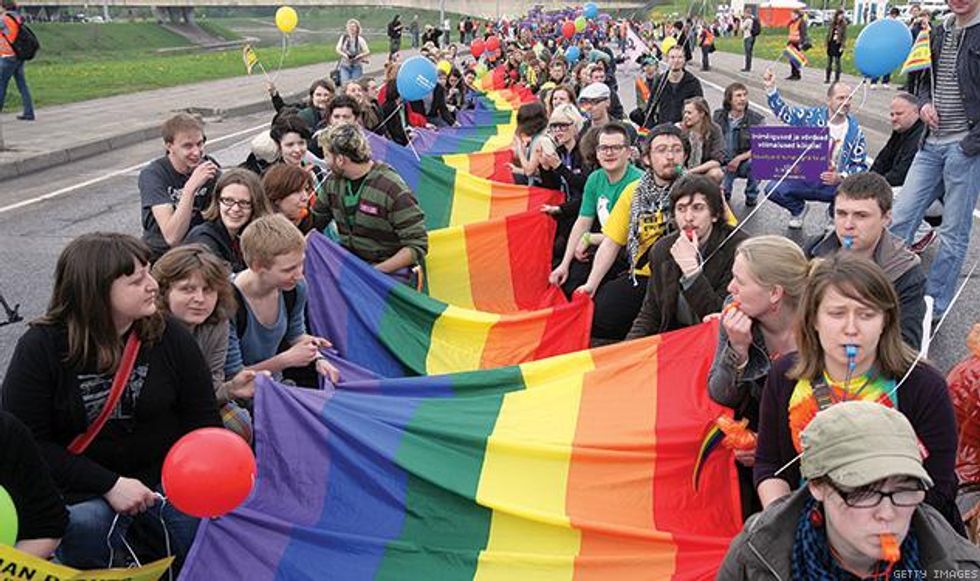
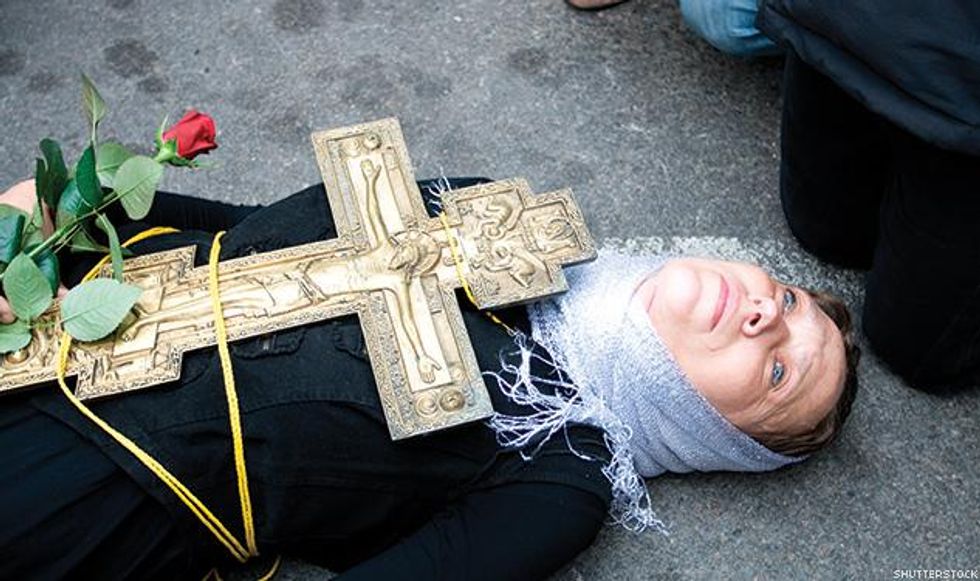
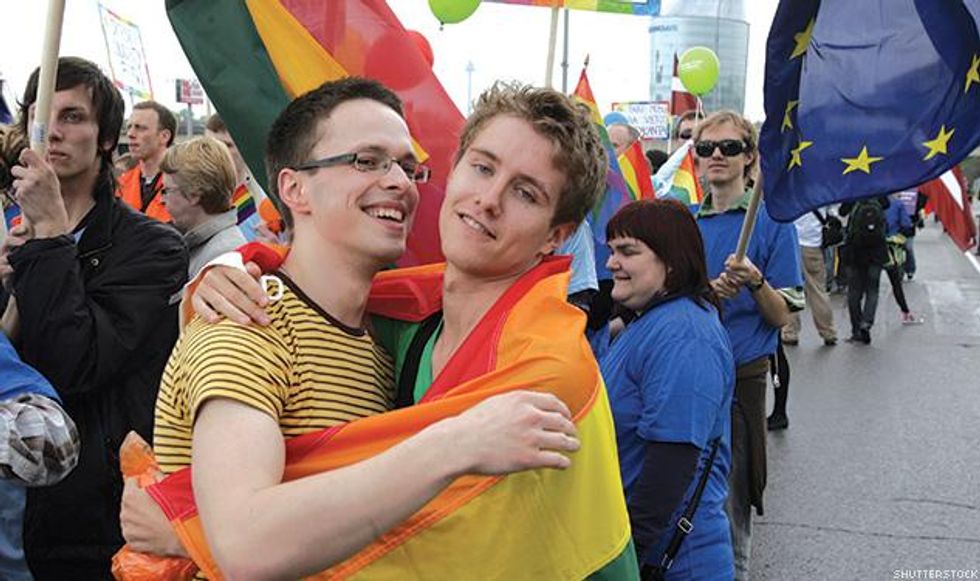


































































Charlie Kirk DID say stoning gay people was the 'perfect law' — and these other heinous quotes